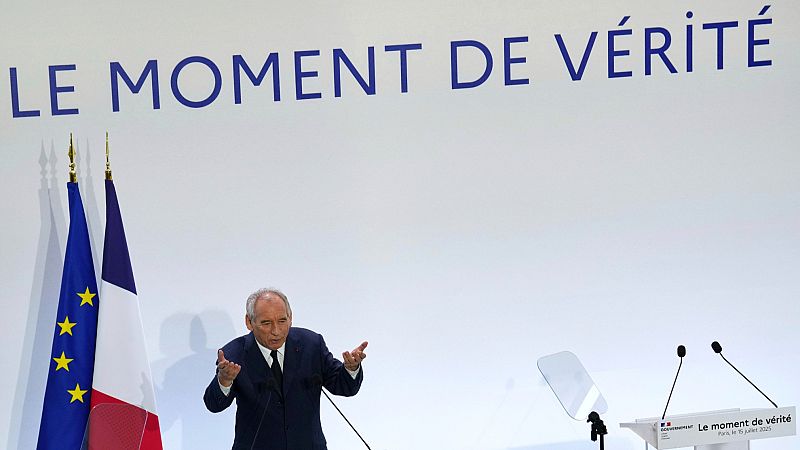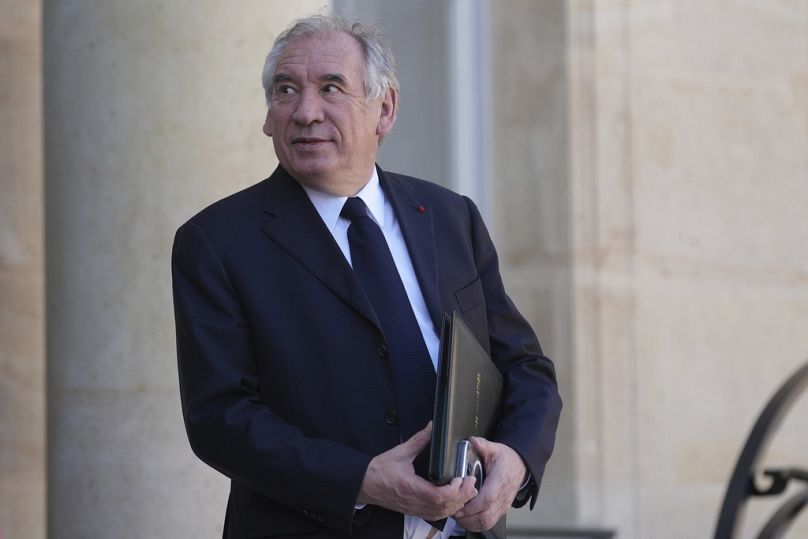French PM François Bayrou faces government collapse — what are the possible scenarios?

French Prime Minister François Bayrou will face a crucial confidence vote in parliament on 8 September, a test that could bring down his fragile government.
Appointed in December last year by French President Emmanuel Macron, Bayrou has been struggling to hold together a minority coalition in a deeply divided National Assembly.
If he loses — which appears to be the most likely outcome — France could enter yet another period of political uncertainty.
Here are some of the different scenarios that could shape French politics in the weeks ahead.
Why is a confidence vote being held?
Bayrou himself triggered the confidence vote, an unusual move in French politics.
At the heart of the standoff is Bayrou's plan to rein in the country's public finances. His 2026 budget plan focuses on sharp deficit reduction from 5.8% last year to below 4.6% next year, which would require steep spending cuts and potentially new tax measures.
One of the most unpopular proposals is the slashing of two public holidays out of France's total of 11, suggesting "as an example" Easter Monday as well as 8 May, a day that commemorates the end of World War II in Europe.
While he frames it as essential to keep debt “at a sustainable level,” opposition parties denounce it as too austere and socially unfair. Mass protests have been announced for 10 September and 18 September across the country.
Unlike a no-confidence motion initiated by the opposition, this vote is a gamble by the prime minister to prove he has the legitimacy to govern.
What are the possible outcomes?
Most likely: The fall of Bayrou's government
Next Monday, Bayrou will deliver a policy speech followed by a debate, then a vote in parliament. 289 votes out of 577 are needed to topple the government.
A likely scenario considering the far-right National Rally, the hard-left France Unbowed (LFI) party, the Communist Party, the Greens and the Socialist Party have announced that they will vote against the head of government.
Once toppled, Bayrou and his ministers will be forced to resign from the government. His cabinet would then be limited to day-to-day affairs until Macron names a successor.
The president would face several options. He could appoint another prime minister from his ranks. Macron could also turn to a figure from civil society or to a politician from another political party who could be capable of building a coalition.
Another possibility would be a technocratic cabinet led by a senior civil servant, broadly accepted by the parties.
Yet all these scenarios run into the same obstacle: the appointed candidate could face another no-confidence vote in a highly fractured lower house split between the left, the centre-right, and the far-right.
An unlikely scenario: Bayrou survives
Although improbable, Bayrou could still manage to scrape through. That would require significant concessions from other parties, especially regarding his budget plan.
This week, the prime minister will meet with various parties to negotiate his survival ahead of next week's vote.
If successful, Bayrou would see his deficit-reduction strategy endorsed in principle, but would then need to negotiate every measure with a hostile parliament.
His survival would be fragile at best, merely delaying the institutional deadlock.
The possibility of a dissolution and snap elections
Since Macron’s surprise decision to dissolve parliament on 9 June 2024, France has been mired in chronic instability.
The French constitution now allows the president to dissolve parliament again, since the one-year waiting period has passed. New legislative elections would then have to be held within 20 to 40 days.
The far-right has long pushed for this scenario, convinced it would win this time, after scoring 33% in the first round of elections in June 2024.
However, the National Rally came in third during the second round after the left and Macron's supporters made concerted efforts to block the far-right's advances in as many districts as possible.
In a recent Ifop poll conducted for French media, 63% of those surveyed wanted the National Assembly to be dissolved and for new legislative elections to be held.
Macron, however, has repeatedly said that calling for snap elections was not his first choice.
And what if Macron resigned?
Faced with repeated political dead ends since the 2024 dissolution, some have raised the question of whether Macron should step down.
The hypothesis remains extremely unlikely. The French president has repeatedly insisted that he will serve out his term until 2027, no matter the political turbulence he faces.
Hard-left firebrand leader Jean-Luc Mélenchon said that “Macron is chaos” and has called for his resignation if Bayrou's proposed vote of confidence on 8 September fails.
Mélenchon also claimed that impeachment proceedings will be initiated at the end of September.
What about the 2026 budget?
The fall of the Bayrou government would automatically block the 2026 budget bill. A new cabinet could present a revised version, following the normal legislative process.
In the unlikely event that no government is in place by the end of 2025, a special provision would allow the 2025 budget to be extended into 2026, ensuring continuity of state revenue and spending.
But such a stopgap would further weaken France’s fiscal credibility in the eyes of credit rating agencies and the European Union.
Today


